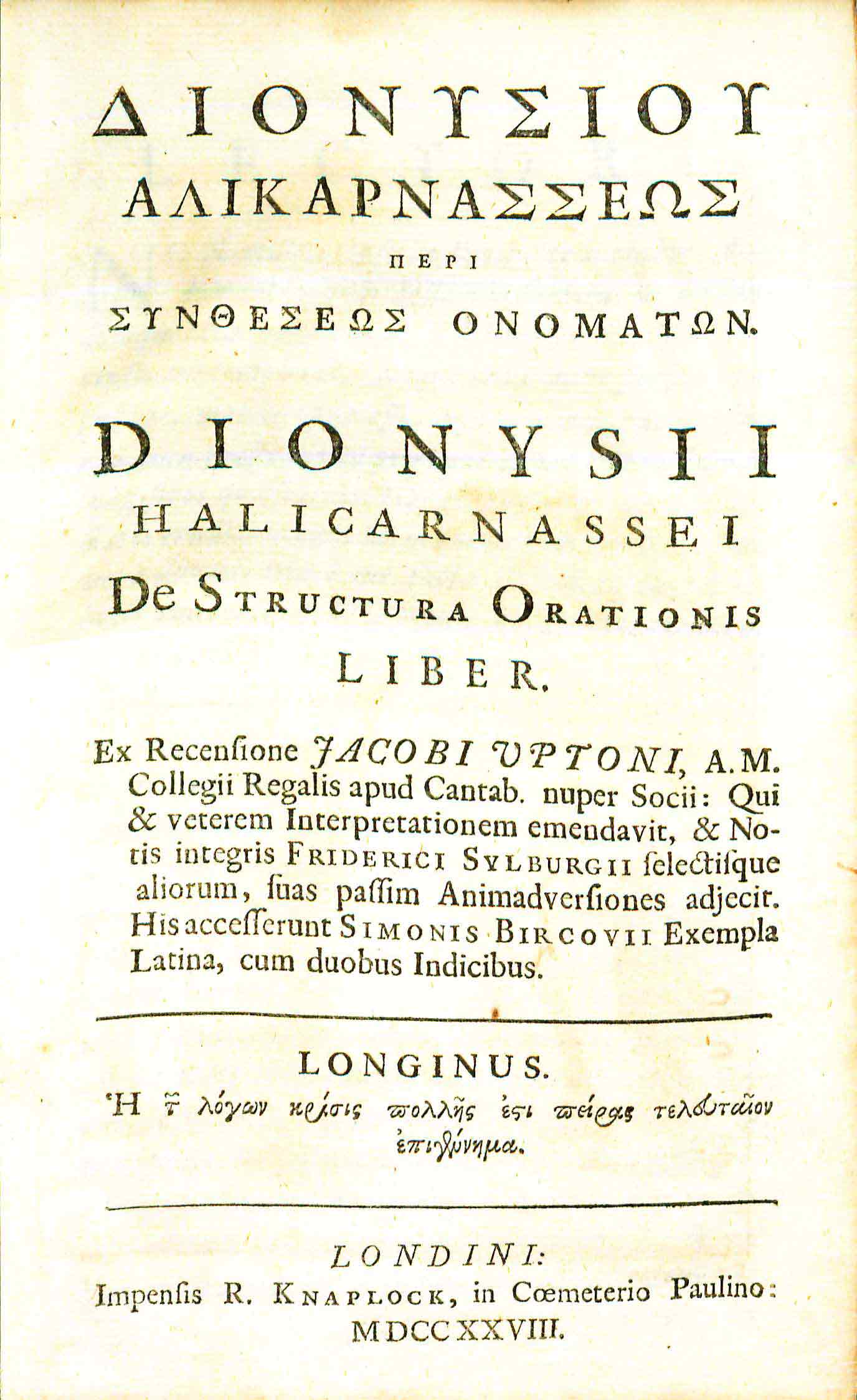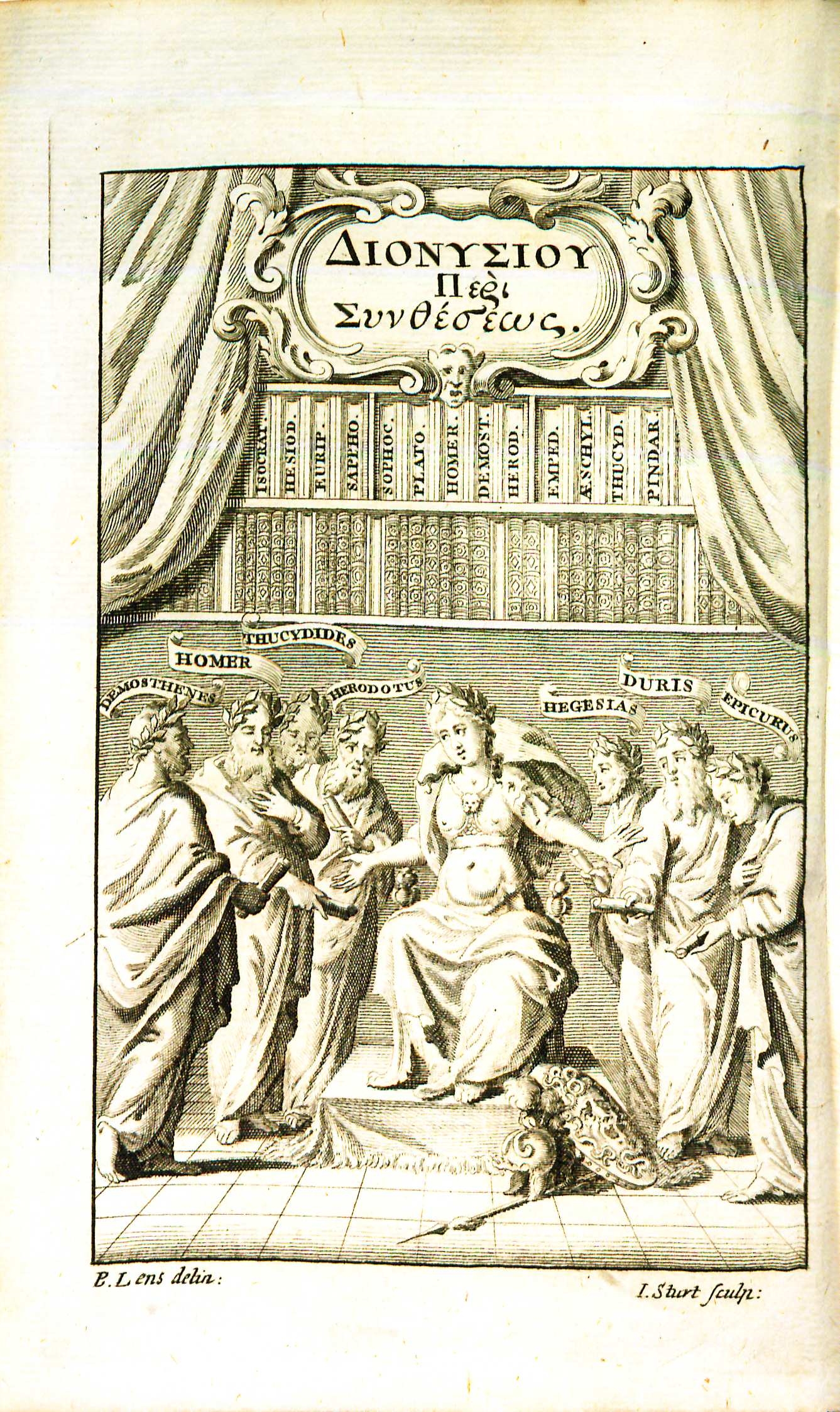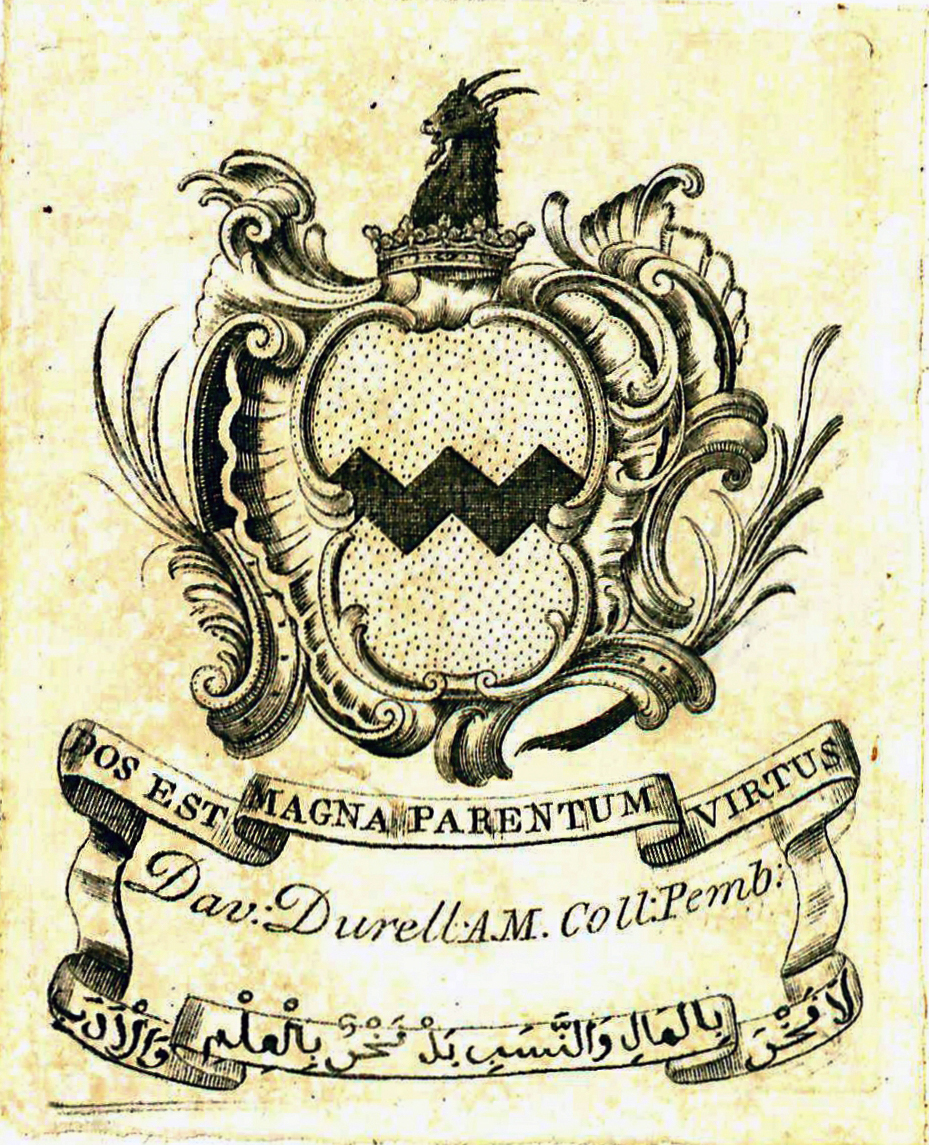Difference between revisions of "Dionysiou Halikarnasseōs Peri Syntheseōs Onomatōn"
m (→Evidence for Inclusion in Wythe's Library) |
|||
| (15 intermediate revisions by 8 users not shown) | |||
| Line 1: | Line 1: | ||
| − | {{DISPLAYTITLE:'' | + | {{DISPLAYTITLE:''Dionysiou Halikarnasseōs Peri Syntheseōs Onomatōn = Dionysii Halicarnassei De Structura Orationis Liber''}} |
| − | |||
===by Dionysius of Halicarnassus=== | ===by Dionysius of Halicarnassus=== | ||
__NOTOC__ | __NOTOC__ | ||
{{BookPageInfoBox | {{BookPageInfoBox | ||
|imagename=DionysiusDionysiouHalikarnasseos1728.jpg | |imagename=DionysiusDionysiouHalikarnasseos1728.jpg | ||
| − | |link=https:// | + | |link=https://wm.primo.exlibrisgroup.com/permalink/01COWM_INST/g9pr7p/alma991025496669703196 |
|shorttitle=Dionysiou Halikarnasseōs Peri Syntheseōs Onomatōn | |shorttitle=Dionysiou Halikarnasseōs Peri Syntheseōs Onomatōn | ||
| − | |author=Dionysius of Halicarnassus | + | |author=[[:Category:Dionysius of Halicarnassus|Dionysius of Halicarnassus]] |
| − | |publoc=Londini | + | |publoc=[[:Category:London|Londini]] |
|publisher=Impensis R. Knaplock, in Cœmeterio Paulino | |publisher=Impensis R. Knaplock, in Cœmeterio Paulino | ||
|year=1728 | |year=1728 | ||
| − | |lang=Latin | + | |lang=[[:Category:Latin|Latin]] |
|pages=263, 43 p. | |pages=263, 43 p. | ||
| − | |desc=8vo (23 cm.) | + | |desc=[[:Category:Octavos|8vo]] (23 cm.) |
| − | }}Dionysius of Halicarnassus (60 BCE–7 BCE) was a Greek historian and an instructor in the art of rhetoric. | + | |shelf=H-2 |
| + | }}[[File:DionysiouHalikarnasseosPeriSyntheseos1728Frontispiece.jpg|left|thumb|250px|<center>Frontispiece.</center>]][http://en.wikipedia.org/wiki/Dionysius_of_Halicarnassus Dionysius of Halicarnassus] (60 BCE–7 BCE) was a Greek historian and an instructor in the art of rhetoric. Dionysius moved to Rome in 30 BCE and spent twenty-two years studying the Latin language and preparing materials for his history.<ref>''Encyclopædia Britannica Online'', s.v. "[http://www.britannica.com/EBchecked/topic/164249/Dionysius-of-Halicarnassus Dionysius of Halicarnassus]," accessed November 7, 2013.</ref> In addition to dedicating time to his own studies, he also gave lessons in rhetoric.<ref>Ibid.</ref> ''Rhōmaïke Archaiologia'' (''Roman Antiquities'') consisted of twenty carefully researched books<ref>William Smith and Charles Anthon, "Dionysius of Halicarnassus" in ''A New Classical Dictionary of Greek and Roman Biography, Mythology, and Geography, Partly Based Upon the Dictionary of Greek and Roman Biography and Mythology'', rev. ed. (New York: Harper & Brothers, 1851), 6.</ref> and is considered to be one of the most valuable sources of early Roman history. <ref>''Encyclopædia Britannica Online'', s.v. "Dionysius of Halicarnassus."</ref> Even though some critics consider Dionysius to be a mediocre historian, many agree that he was an exceptional literary critic who was proficient at examining an author’s style and historical context.<ref>Ibid.</ref> In addition to authoring his extensive history of Rome, Dionysius also wrote essays on a variety of topics. This work, “Peri syntheseos onomaton,” is the only surviving ancient discussion of word order.<ref>Ibid.</ref> | ||
==Evidence for Inclusion in Wythe's Library== | ==Evidence for Inclusion in Wythe's Library== | ||
| + | Listed in the [[Jefferson Inventory]] of [[Wythe's Library]] as "Dionysius Halicarnasseus." and given by [[Thomas Jefferson]] to his grandson [[Thomas Jefferson Randolph]]. The [https://digitalarchive.wm.edu/handle/10288/13433 Brown Bibliography]<ref>Bennie Brown, "The Library of George Wythe of Williamsburg and Richmond," (unpublished manuscript, May, 2012) Microsoft Word file. Earlier edition available at: https://digitalarchive.wm.edu/handle/10288/13433.</ref> lists the 1615 Hanover edition of ''Dionysii Halicarnassei Scripta qvæ extant Omnia'' based on one of the copies Jefferson sold to the Library of Congress.<ref>E. Millicent Sowerby, ''Catalogue of the Library of Thomas Jefferson'', (Washington, D.C.: The Library of Congress, 1952-1959), 1:23-24 [http://babel.hathitrust.org/cgi/pt?id=mdp.39015033648091;view=1up;seq=54 [no.48]].</ref> [http://www.librarything.com/profile/GeorgeWythe George Wythe's Library]<ref>''LibraryThing'', s.v. "[http://www.librarything.com/profile/GeorgeWythe Member: George Wythe]," accessed on April 21, 2013.</ref> on LibraryThing states "Precise work/edition unknown." Unable to verify a specific title or edition, the Wolf Law Library purchased ''Dionysiou Halikarnasseōs Peri Syntheseōs Onomatōn'' when a copy became available. | ||
| + | {{BookPageBookplate | ||
| + | |imagename=DionysiouHalikarnasseosPeriSyntheseos1728Bookplate.jpg | ||
| + | |display=left | ||
| + | |caption=Bookplate of David Durell, front pastedown. | ||
| + | }}==Description of the Wolf Law Library's copy== | ||
| + | Bound in contemporary full roan with red morocco label on gilt-decorated spine. Includes the armorial bookplate of "[http://en.wikipedia.org/wiki/David_Durell Dav. Durrell], A.M. Coll. Pemb." with the motto "Dos est magna parentum virtus" (The virtue of parents is a great dowry" (Horace)) on the front pastedown. A second motto is written on the printed bookplate in Arabic: "لا فخر بالمال والنسب بل فخر بالعلم والأدب" (Nobleness is not in wealth and lineage, rather nobleness is in knowledge and culture). The rear pastedown includes the inscription "Prosperum felix sellus virtus appellatur." Purchased from Rulon-Miller Books.<br /> | ||
| + | <br /> | ||
| + | Images of the library's copy of this book are [https://www.flickr.com/photos/wolflawlibrary/albums/72157637634248513 available on Flickr.] View the record for this book in [https://wm.primo.exlibrisgroup.com/permalink/01COWM_INST/g9pr7p/alma991025496669703196 William & Mary's online catalog]. | ||
| + | [[File:DionysiouHalikarnasseosPeriSyntheseos1728InscriptionRPD.jpg|center|thumb|250px|<center>Inscription, rear pastedown.</center>]] | ||
| + | |||
| + | ==See also== | ||
| + | <div style="overflow: hidden;"> | ||
| + | *[[George Wythe Room]] | ||
| + | *[[Jefferson Inventory]] | ||
| + | *[[Wythe's Library]] | ||
| + | </div> | ||
| − | + | ==References== | |
| − | |||
| − | |||
| − | |||
| − | |||
<references/> | <references/> | ||
| + | [[Category:Dionysius of Halicarnassus]] | ||
[[Category:George Wythe Collection at William & Mary's Wolf Law Library]] | [[Category:George Wythe Collection at William & Mary's Wolf Law Library]] | ||
[[Category:Language and Rhetoric]] | [[Category:Language and Rhetoric]] | ||
| + | [[Category:Thomas Jefferson Randolph's Books]] | ||
[[Category:Titles in Wythe's Library]] | [[Category:Titles in Wythe's Library]] | ||
| + | |||
| + | [[Category:Latin]] | ||
| + | [[Category:London]] | ||
| + | [[Category:Octavos]] | ||
Latest revision as of 13:51, 28 May 2025
by Dionysius of Halicarnassus
| Dionysiou Halikarnasseōs Peri Syntheseōs Onomatōn | |
|
Title page from Dionysiou Halikarnasseōs Peri Syntheseōs Onomatōn, George Wythe Collection, Wolf Law Library, College of William & Mary. | |
| Author | Dionysius of Halicarnassus |
| Published | Londini: Impensis R. Knaplock, in Cœmeterio Paulino |
| Date | 1728 |
| Language | Latin |
| Pages | 263, 43 p. |
| Desc. | 8vo (23 cm.) |
| Location | Shelf H-2 |
Evidence for Inclusion in Wythe's Library
Listed in the Jefferson Inventory of Wythe's Library as "Dionysius Halicarnasseus." and given by Thomas Jefferson to his grandson Thomas Jefferson Randolph. The Brown Bibliography[7] lists the 1615 Hanover edition of Dionysii Halicarnassei Scripta qvæ extant Omnia based on one of the copies Jefferson sold to the Library of Congress.[8] George Wythe's Library[9] on LibraryThing states "Precise work/edition unknown." Unable to verify a specific title or edition, the Wolf Law Library purchased Dionysiou Halikarnasseōs Peri Syntheseōs Onomatōn when a copy became available.
Description of the Wolf Law Library's copy
Bound in contemporary full roan with red morocco label on gilt-decorated spine. Includes the armorial bookplate of "Dav. Durrell, A.M. Coll. Pemb." with the motto "Dos est magna parentum virtus" (The virtue of parents is a great dowry" (Horace)) on the front pastedown. A second motto is written on the printed bookplate in Arabic: "لا فخر بالمال والنسب بل فخر بالعلم والأدب" (Nobleness is not in wealth and lineage, rather nobleness is in knowledge and culture). The rear pastedown includes the inscription "Prosperum felix sellus virtus appellatur." Purchased from Rulon-Miller Books.
Images of the library's copy of this book are available on Flickr. View the record for this book in William & Mary's online catalog.
See also
References
- ↑ Encyclopædia Britannica Online, s.v. "Dionysius of Halicarnassus," accessed November 7, 2013.
- ↑ Ibid.
- ↑ William Smith and Charles Anthon, "Dionysius of Halicarnassus" in A New Classical Dictionary of Greek and Roman Biography, Mythology, and Geography, Partly Based Upon the Dictionary of Greek and Roman Biography and Mythology, rev. ed. (New York: Harper & Brothers, 1851), 6.
- ↑ Encyclopædia Britannica Online, s.v. "Dionysius of Halicarnassus."
- ↑ Ibid.
- ↑ Ibid.
- ↑ Bennie Brown, "The Library of George Wythe of Williamsburg and Richmond," (unpublished manuscript, May, 2012) Microsoft Word file. Earlier edition available at: https://digitalarchive.wm.edu/handle/10288/13433.
- ↑ E. Millicent Sowerby, Catalogue of the Library of Thomas Jefferson, (Washington, D.C.: The Library of Congress, 1952-1959), 1:23-24 [no.48].
- ↑ LibraryThing, s.v. "Member: George Wythe," accessed on April 21, 2013.



